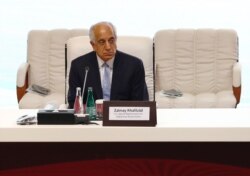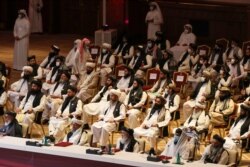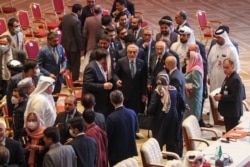Even as Afghan President Ashraf Ghani reiterated his demand for a cease-fire, few watching the peace talks in Doha expected a positive response from the Taliban.
"[T]he Afghan people have a clear and urgent priority: a cease-fire. An urgent end to the violence will more than anything else give us a chance to progress,” Ghani said in his address to the United Nations Wednesday.
The Taliban response was clear.
“If we stop fighting, then what does there remain to talk about,” a member of the Taliban negotiating team in Doha told NBC News, according to a story published earlier this week.
As the historic negotiations between the Taliban and an Afghan team, including government representatives, enter their third week, the talks are stuck on the most basic of questions, like how to describe the two decades of war in Afghanistan. The Taliban want to call it “jihad.” The other side disagrees.
Yet, those who have watched and analyzed the conflict think of it as a positive development.
“Taliban refusal of an immediate cease-fire, language used to discuss non-Hanafi Sunni Islamic law, women's rights and future role … these same issues were the reality of the conflict every day for years,” said Andrew Watkins of the International Crisis Group, an independent, non-profit organization working to prevent conflict. The start of difficult discussions on how to change things, he said, was a step forward.
The United States, which prepared the ground for the current peace talks by holding its own 18-month-long negotiation with the Taliban and signing a historic deal with the militant group it once called “terrorists,” understood that the continuing violence may be problematic.
“By any measure, the current levels of violence are too high,” Zalmay Khalilzad, the U.S. official in charge of negotiating with the Taliban, told members of the U.S. House of Representatives this week.
However, Khalilzad also seemed to believe that the best way of reducing the violence was through the current negotiations.
“We hope that the current negotiations will lead to a significant reduction in violence by all sides, reducing the number of Afghans getting killed or wounded. ... We, for our part, will continue to press for this objective,” he said.
Even though the Taliban have so far refused to commit to a cease-fire, they say they hope for an end to war.
“Yes, we are hopeful, and that is why we came here. We have a strong will to start the meetings and reach a conclusion,” Mohammad Naeem, the Taliban’s Doha-based spokesman, told VOA’s Afghan Service this week.
Still, the two sides are poles apart when it comes to their aspirations for the country. The Afghan team is trying to safeguard the constitution and all the rights that women, minorities, and others have gained in the last 20 years.
The Taliban, according to Naeem, want to define all rights according to their interpretation of Islam.
“We cannot bring the values of other societies and impose them on our society. For example, we cannot justify women's rights on the basis of the values that exist in the United States, in Europe, and in other countries. Our nation does not want this at all. Our nation is Muslim,” he said.
This worries women’s rights activists in Afghanistan. The previous Taliban regime in the 1990s was considered a repressive theocracy by most of the world.
While skeptics feel the Taliban may be wedded to the same old ideology, Michael Kugelman, deputy director of the Asia program at the Wilson Center in Washington, said there may be a younger generation of Taliban leaders ready to be flexible.
“By being vague in public comments, the Taliban may be betraying the lack of consensus within the broader organization about what direction it truly wants to take,” Kugelman said.
Watkins of the International Crisis Group said the Taliban have shown that it can be both ideological and pragmatic.
“The Taliban are flexible in interpreting sharia when they are presented with a sufficiently compelling reason to do so. If their reality on the ground changes, or if the benefits that may result become obvious, the group may very well show flexibility even on the issues we assume are its core beliefs,” he said.
Khalilzad seemed to favor Watkins’s view, and U.S. policy seemed to be geared toward compelling a change in Taliban behavior through offers of assistance.
“While we do not seek to impose our system on others, we have made it clear to the negotiators that their choices and conduct will affect the size and scope of future U.S. assistance,” Khalilzad said.
The Taliban have repeatedly said they want a continuation of international aid after the withdrawal of U.S. forces.
According to Watkins, top Taliban figures have “begun to privately admit that their period of governance was rife with flaws and failures.”
Ironically, the biggest challenge to the talks seemed to be emerging not from the Taliban but from internal divisions among Afghan political factions.
The membership of the High Council for National Reconciliation, the body that is supposed to oversee negotiations with the Taliban, is not yet final. When Ghani announced a list of members, it was rejected by his political rival and the Council’s head, Abdullah Abdullah.
“Already, figures such as (Gulbuddin) Hekmatyar (former warlord-politician) have begun openly calling for separate, divided negotiations with the Taliban. And this reflects a much larger number of Afghan leaders who have been quietly communicating with the group,” said Watkins.
The divisions, said Kugelman, did not look good for Kabul, since it appeared its team was pitted against a well-organized and united Taliban negotiating team.
The complex negotiations also face the prospect of the withdrawal of all U.S. forces from Afghanistan, reducing the Afghan team’s leverage even further.
“The U.S.-Taliban deal obliged the Taliban to start peace talks, not conclude them, in order for U.S. troops to depart,” said Kugelman.
Both President Donald Trump and his rival in the presidential election, former Vice President Joe Biden, have expressed their intention to leave Afghanistan.
The last time a foreign army left Afghanistan was the Soviet Union in 1989. Afghanistan fell into a vicious civil war and has not seen peace since.
Khalilzad and other senior U.S. officials hope they can “help Afghanistan seize this historic moment and avoid repeating what happened in the 1990s.” But they also acknowledge that the road ahead is full of challenges.
Najiba Salam of VOA's Afghan Service contributed to this report.







